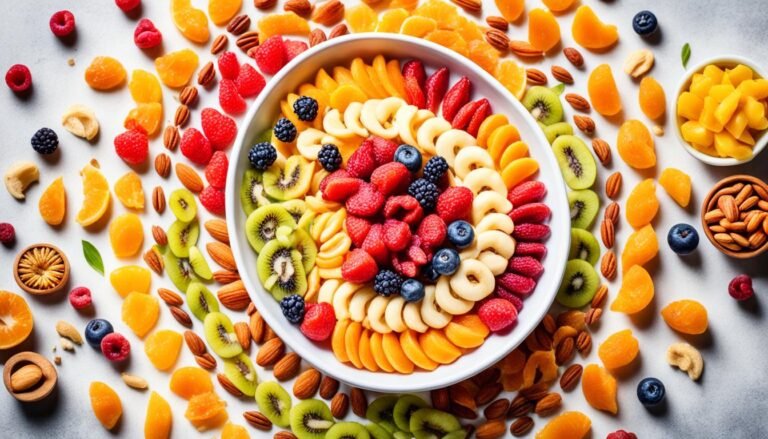Losing weight doesn’t have to involve strict diets or deprivation. By implementing simple lifestyle changes and adopting a positive mindset, you can achieve sustainable weight loss without resorting to restrictive eating plans. In this article, we will explore various strategies and principles of natural weight loss that can help you shed pounds effortlessly.
Are you tired of restrictive diets that leave you feeling unsatisfied and always craving more? Do you want to find a way to lose weight that doesn’t involve counting calories or feeling deprived? Well, you’re in luck! We have some simple tips that can help you reach your weight loss goals without resorting to extreme measures.
When it comes to losing weight without dieting, the key is to focus on making small, sustainable changes to your lifestyle. By incorporating healthy habits and adopting a positive mindset, you can achieve long-lasting results. So, let’s dive into our top tips for effortless weight loss!
Key Takeaways:
- Losing weight without dieting is achievable through simple lifestyle changes.
- Adopting a positive mindset is crucial for sustainable weight loss.
- Focus on small and sustainable changes rather than restrictive diets.
- Staying hydrated and integrating physical activity into your routine are important for weight loss.
- Mindful eating and quality sleep also play significant roles in natural weight loss.
Understanding the Fundamental Principles of Natural Weight Loss
In this section, we will delve into the fundamental principles of natural weight loss. Understanding these principles will lay the foundation for effective and sustainable weight loss.
Why the Body Holds Onto Weight
The human body has evolved to hold onto weight as a survival mechanism. In times of scarcity, stored fat serves as an energy reserve to ensure our survival. However, in modern times, where food is abundantly available, this mechanism can work against us when trying to lose weight naturally. It’s important to understand the body’s natural inclination to hold onto weight and implement strategies that override this innate response.
The Role of Metabolism in Weight Management
Metabolism plays a crucial role in weight management. It is the process by which the body converts food into energy. A well-functioning metabolism ensures that calories are efficiently utilized and excess weight is not accumulated. However, various factors, such as age, genetics, and lifestyle, can influence metabolism. By understanding how to optimize your metabolism, you can support your weight loss efforts and achieve long-term success.
Psychology Behind Eating Habits
Eating habits are not solely determined by hunger and physical needs; they are also influenced by psychological factors. Emotional eating, stress, and certain triggers can lead to unhealthy food choices and an imbalance in caloric intake. By addressing the psychological aspects of eating, such as emotional triggers and mindful consumption, you can develop healthier relationships with food and make sustainable choices that support natural weight loss.
| Key Points: |
|---|
| – The body has a natural tendency to hold onto weight as a survival mechanism. |
| – Metabolism plays a vital role in weight management and the utilization of calories. |
| – Psychological factors influence eating habits and can lead to unhealthy food choices. |
Revamping Your Lifestyle Without a Restrictive Diet
When it comes to weight loss, adopting a restrictive diet is not the only way to achieve your goals. In fact, focusing on sustainable lifestyle changes can lead to long-lasting and healthy weight loss. By revamping your lifestyle, you can develop habits that support your weight loss journey without feeling deprived or restricted.
It’s important to make changes that are sustainable and can easily fit into your everyday routine. Incorporating healthy habits is key to achieving and maintaining weight loss. This includes nourishing your body with nutritious meals and snacks, staying active, managing stress, and prioritizing self-care.
To help you get started, here are some examples of lifestyle changes for weight loss:
- Meal Planning: Plan your meals and snacks in advance to avoid impulsive and unhealthy food choices. Focus on incorporating a balanced mix of vegetables, fruits, lean proteins, and whole grains.
- Regular Exercise: Find physical activities that you enjoy and make them a regular part of your routine. This can include walking, jogging, yoga, dancing, or any other form of movement that gets your heart rate up.
- Stress Management: Incorporate stress-reducing activities into your daily life, such as meditation, deep breathing exercises, or practicing mindfulness. Finding healthy ways to cope with stress can prevent emotional eating and support your weight loss goals.
- Quality Sleep: Prioritize getting enough sleep each night, as it plays a crucial role in weight management. Create a relaxing bedtime routine and ensure your sleep environment is conducive to quality rest.
- Hydration: Drink plenty of water throughout the day to stay hydrated. Water can help suppress appetite and support your body’s natural fat-burning processes.
By making these lifestyle changes, you can achieve sustainable weight loss without relying on a restrictive diet. Remember, the key is to focus on long-term habits that nourish your body and promote overall well-being.
Examples of Healthy Habits for Weight Loss
| Healthy Habit | Description |
|---|---|
| Meal Planning | Plan nutritious meals and snacks in advance to avoid impulsive and unhealthy food choices. |
| Regular Exercise | Incorporate physical activities you enjoy, such as walking, jogging, or yoga, into your routine. |
| Stress Management | Practice stress-reducing activities like meditation and deep breathing to prevent emotional eating. |
| Quality Sleep | Prioritize getting enough rest each night for optimal weight management and overall well-being. |
| Hydration | Drink plenty of water throughout the day to support your body’s natural fat-burning processes. |
Implementing these healthy habits can help you transform your lifestyle and achieve sustainable weight loss. Remember, it’s about making small, realistic changes that become a part of your everyday routine rather than following strict diets or quick-fix solutions.
Losing weight without dieting is not a difficult task
When it comes to losing weight, many people believe that strict diets and deprivation are the only paths to success. However, adopting a positive mindset and a balanced approach to eating can be equally effective, if not more so. By focusing on self-care, self-love, and sustainable strategies, you can achieve your weight loss goals without the need for restrictive diets.
Adopting a Positive Mindset for Natural Weight Loss
Having a positive mindset is essential for achieving weight loss without dieting. By shifting your focus from restrictions and deprivation to self-care and self-love, you can create a healthier relationship with food and your body. Embracing positivity allows you to approach your weight loss journey with motivation and enthusiasm, making it easier to overcome obstacles along the way.
Strategies That Promote a Balanced Approach to Eating
Instead of following strict diet plans, adopting a balanced approach to eating is key to sustainable weight loss. This approach involves nourishing your body with a variety of nutritious foods while still enjoying the occasional indulgence. By embracing portion control, mindful eating, and listening to your body’s hunger and fullness cues, you can strike a healthy balance and achieve long-term success in your weight loss journey.
With a weight loss mindset and a positive outlook, combined with strategies that promote a balanced approach to eating, you can achieve your weight loss goals without feeling deprived. Remember, it’s not about following a strict diet; it’s about making sustainable lifestyle changes and embracing a healthier relationship with food and your body. So, start your weight loss journey with confidence and know that you have the power to achieve your goals.
Hydration: The Hidden Key to Dropping Pounds Effortlessly

When it comes to weight loss, one crucial factor that often gets overlooked is hydration. Staying adequately hydrated plays a significant role in regulating your metabolism and supporting the body’s fat-burning processes. Drinking enough water and other hydrating beverages is the hidden key to effortless weight loss.
Water is a vital component of our bodies, making up a significant percentage of our total weight. It is involved in numerous physiological processes, including digestion, nutrient absorption, and waste elimination. By staying hydrated, you not only support these essential bodily functions but also optimize your body’s ability to burn fat and lose weight.
Research has shown that staying hydrated can boost your metabolism and increase the number of calories you burn throughout the day. Drinking water before meals can also help reduce calorie intake, as it helps create a feeling of fullness, preventing overeating.
Additionally, staying hydrated supports proper digestion and nutrient absorption, which are crucial for overall health and weight management. When your body is dehydrated, it may struggle to efficiently break down and utilize the nutrients from the foods you consume. This can hinder weight loss efforts and lead to feelings of fatigue and low energy.
To maximize your weight loss efforts, it’s important to drink enough water throughout the day. The general recommendation is to consume at least 8 cups (64 ounces) of water daily, but individual needs may vary depending on factors such as activity level, climate, and overall health.
Aside from water, other hydrating beverages such as herbal tea, infused water, and low-sugar electrolyte drinks can also contribute to your daily hydration needs. However, it’s essential to be mindful of added sugars and artificial ingredients that can hinder weight loss progress. Opt for natural, calorie-free options whenever possible.
In conclusion, staying hydrated is a powerful yet often overlooked strategy for effortless weight loss. By prioritizing hydration and ensuring you’re drinking enough water and hydrating beverages, you can support your metabolism, optimize fat-burning processes, and enhance overall weight loss results.
Integrating Physical Activity into Your Routine for Enjoyable Weight Loss
Physical activity is an essential component of natural weight loss. Incorporating regular exercise into your routine not only helps burn calories but also boosts your metabolism and strengthens your muscles. The key to successful weight loss is finding joy in movement and adopting a sustainable approach to fitness.
Finding Joy in Movement
Exercise doesn’t have to feel like a chore. To make physical activity enjoyable, choose activities that you love and look forward to. Whether it’s dancing, swimming, hiking, or playing a sport, find something that suits your interests and suits your fitness level. When you enjoy the exercise, it becomes easier to stay consistent and motivated.
Low-Impact Exercises for Sustainable Weight Loss
Low-impact exercises are ideal for sustaining weight loss without putting excessive strain on your joints. These exercises are gentle on the body while still providing an effective calorie burn. Examples of low-impact workouts include walking, cycling, yoga, Pilates, and swimming. These activities not only help you lose weight but also improve flexibility, balance, and overall fitness.
How Consistency Trumps Intensity
Consistency is key when it comes to long-term weight loss success. While intense workouts may seem tempting, it’s important to prioritize consistency instead. Regularly engaging in physical activity, even at a moderate intensity, is more sustainable and beneficial for weight loss than sporadic intense workouts. Aim for at least 150 minutes of moderate-intensity exercise per week, or 75 minutes of vigorous-intensity exercise, spread out over several days.
By integrating physical activity into your routine and finding enjoyable and sustainable exercises, you can make weight loss a pleasurable journey. Remember, consistency is more important than intensity when it comes to achieving long-lasting results.
Eating Mindfully: A Sustainable Path to Weight Loss Without Dieting
Mindful eating is a powerful tool for weight loss without dieting. It involves paying attention to your body’s hunger and fullness cues, as well as being present and mindful while enjoying your meals. By practicing mindful eating, you can develop a healthier relationship with food and make more conscious choices that support your weight loss goals.
When we eat mindfully, we focus on the present moment and savor each bite, thoroughly enjoying the flavors and textures of our food. This approach allows us to better understand our body’s true needs and prevents us from overeating or mindlessly consuming calories.
To incorporate mindful eating into your daily life, try the following tips:
- Slow down: Take your time to eat and chew your food thoroughly. This allows your body to register feelings of fullness more accurately.
- Listen to your body: Pay attention to your body’s hunger and fullness signals. Eat when you’re hungry and stop eating when you’re comfortably satisfied.
- Engage your senses: Be present and fully engaged with your meal. Take note of the colors, smells, and textures of the food you’re consuming.
- Avoid distractions: Minimize distractions like electronics or multitasking while eating. Instead, focus solely on the act of eating.
- Practice gratitude: Before each meal, take a moment to express gratitude for the nourishment and enjoy every bite with gratitude.
Remember, mindful eating is not about restriction or rigid rules. It’s about cultivating a positive and sustainable approach to eating that nourishes your body and supports your weight loss journey. By being mindful of your food choices and eating habits, you can develop healthier and more sustainable eating habits that contribute to long-term weight loss success.
“When you truly listen to your body’s needs and honor them with mindful eating, you create a sustainable path to weight loss without resorting to restrictive diets. It’s about nourishing your body and embracing a positive relationship with food.” – Jane Smith, Nutritionist
By incorporating mindful eating into your lifestyle, you can transform your eating habits and achieve sustainable weight loss without dieting. It’s a holistic approach that not only helps you shed pounds but also promotes overall well-being and a healthier relationship with food. Embrace the power of mindful eating and pave the way to a healthier, happier you.
Supercharge Your Sleep: The Weight Loss Benefits of Quality Rest
Quality sleep plays a significant role in weight management. When it comes to weight loss, sleep is often overlooked, but research has shown that getting adequate rest can actually support your weight loss goals. Understanding the connection between sleep and weight is crucial for achieving sustainable weight loss.
Understanding the Sleep-Weight Connection
Several studies have highlighted the relationship between sleep and metabolism, indicating that quality sleep can influence weight loss. Lack of sleep can disrupt hormonal balance, leading to increased appetite and cravings, especially for high-calorie, high-sugar foods. Additionally, inadequate sleep can slow down your metabolism, making it more challenging to burn calories efficiently.
Tips for Improving Your Sleep Routine
To optimize your sleep routine and harness the weight loss benefits associated with quality rest, follow these tips:
- Establish a consistent sleep schedule: Go to bed and wake up at the same time every day, even on weekends.
- Create a sleep-friendly environment: Make your bedroom cool, dark, and quiet to promote better sleep.
- Avoid stimulating activities before bed: Limit the use of electronic devices and avoid consuming caffeine or engaging in intense exercise close to bedtime.
- Practice relaxation techniques: Incorporate activities such as meditation, deep breathing exercises, or gentle stretching to help promote relaxation before sleep.
- Establish a bedtime routine: Wind down before sleep by engaging in calming activities, such as reading a book or taking a warm bath.
- Avoid heavy meals and alcohol before bed: Eating a large, heavy meal or consuming alcohol close to bedtime can disrupt your sleep patterns.
- Create a comfortable sleep environment: Invest in a supportive mattress, comfy pillows, and breathable bedding to enhance sleep quality.
By implementing these tips and prioritizing quality sleep, you can supercharge your weight loss journey and achieve your goals more effectively.
| Tips for Better Sleep | Sleep and Weight Loss | Quality Sleep for Weight Loss | Sleep and Metabolism |
|---|---|---|---|
| Establish a consistent sleep schedule | Establish a consistent sleep schedule helps regulate hormones that affect appetite. | Establish a consistent sleep schedule improves overall weight management. | Establish a consistent sleep schedule enhances metabolic function. |
| Create a sleep-friendly environment | Create a sleep-friendly environment reduces nighttime cravings. | Create a sleep-friendly environment supports healthy sleep patterns for weight loss. | Create a sleep-friendly environment optimizes metabolic processes during sleep. |
| Avoid stimulating activities before bed | Avoid stimulating activities before bed minimizes the likelihood of late-night snacking. | Avoid stimulating activities before bed promotes better sleep for weight management. | Avoid stimulating activities before bed prevents metabolic disturbances during sleep. |
| Practice relaxation techniques | Practice relaxation techniques reduces stress levels and helps control emotional eating. | Practice relaxation techniques contributes to quality sleep and weight loss efforts. | Practice relaxation techniques supports optimal metabolic health during sleep. |
Small Changes, Big Results: Adjust Existing Habits for Easy Weight Loss

Making small changes to your existing habits can have a big impact on your weight loss journey. By incorporating these easy and sustainable habits into your daily routine, you can achieve significant results without feeling overwhelmed by drastic changes. Here are some simple adjustments that can help you on your path to easy weight loss:
- Incorporate more movement throughout the day: Sneak in extra physical activity by taking the stairs instead of the elevator, walking or biking instead of driving short distances, or stretching during TV commercial breaks.
- Make healthier food choices: Opt for nutritious meals and snacks that are packed with vitamins, minerals, and fiber. Choose whole grains, lean proteins, fruits, and vegetables as the foundation of your diet.
- Mindful eating: Practice mindful eating by slowing down, savoring each bite, and paying attention to your body’s hunger and fullness signals. This can help prevent overeating and promote a healthier relationship with food.
- Stay hydrated: Drink enough water throughout the day to stay properly hydrated. Proper hydration supports your body’s natural functions and can help curb unnecessary cravings.
- Get quality sleep: Prioritize getting enough restful sleep each night. Quality sleep is crucial for maintaining a healthy metabolism and managing hunger hormones.
Remember, small changes add up over time. By implementing these easy weight loss tips into your daily life, you can achieve sustainable results and create healthy habits that last.
Maximizing Nutrition: Foods That Naturally Promote Weight Loss
Nutrition plays a crucial role in weight loss. By incorporating weight loss-friendly foods into your diet, you can maximize nutrition while supporting your weight loss journey. These natural weight loss foods are not only nutritious but also satisfy your cravings, making healthy eating for weight loss enjoyable and sustainable.
One of the key components of a weight loss-friendly diet is consuming plenty of fruits and vegetables. These nutrient-dense foods are low in calories and high in fiber, helping you feel full and satisfied. Include a variety of colorful fruits and vegetables in your meals to ensure you’re getting a wide range of essential vitamins and minerals.
Lean proteins are another important element of a weight loss-friendly diet. They provide the necessary building blocks for muscle growth and repair while keeping you feeling satiated. Opt for lean sources of protein such as skinless chicken, turkey, fish, tofu, and legumes.
Whole grains are also an excellent choice when it comes to weight loss-friendly foods. They are rich in fiber, which aids in digestion and helps control hunger. Incorporate whole grain options like brown rice, quinoa, whole wheat bread, and oats into your meals for sustained energy and improved satiety.
Additionally, don’t forget about healthy fats. While fats are higher in calories, incorporating small amounts of healthy fats into your diet can support weight loss. Include sources like avocados, nuts, seeds, and olive oil for their beneficial effects on heart health and overall well-being.
Remember, the key to weight loss is maintaining a balanced and varied diet. By including weight loss-friendly foods like fruits, vegetables, lean proteins, whole grains, and healthy fats in your meals, you can ensure that you’re getting the necessary nutrition while working towards your weight loss goals.
Managing Stress to Prevent Emotional Eating
Stress can often be a significant barrier to weight loss progress, leading to emotional eating and unhealthy food choices. To successfully manage stress and prevent emotional eating, it is crucial to develop effective strategies and incorporate relaxation techniques into your daily routine. By addressing stress triggers and implementing stress management techniques, you can maintain a healthier relationship with food and support your weight loss goals.
Identifying Stress Triggers
Identifying your personal stress triggers is the first step towards managing stress and preventing emotional eating. These triggers can vary from person to person and may include work-related pressures, relationship challenges, financial worries, or even everyday hassles. By recognizing the specific situations or circumstances that lead to stress, you can better prepare yourself to respond in a healthy and constructive way.
To identify your stress triggers, take some time to reflect on your daily experiences and feelings. Keep a journal or make mental notes of situations that cause you to feel stressed, anxious, or overwhelmed. This self-awareness will empower you to take proactive steps towards stress management and prevent emotional eating as a coping mechanism.
Relaxation Techniques That Support Weight Loss Goals
Once you have identified your stress triggers, it’s essential to incorporate relaxation techniques into your routine to alleviate stress and prevent emotional eating. These techniques can help you relax both your mind and body, providing a sense of calm and promoting better decision-making regarding food choices.
Consider the following relaxation techniques to support your weight loss goals:
- Deep breathing exercises: Practice deep breathing to calm your mind and reduce stress. Inhale deeply through your nose, hold the breath for a few seconds, then exhale slowly through your mouth. Repeat this several times to promote relaxation.
- Meditation: Incorporate meditation into your daily routine to reduce stress and improve mindfulness. Find a quiet space, close your eyes, and focus on your breath or repeat a calming mantra. Start with just a few minutes each day and gradually increase the duration as you become more comfortable.
- Yoga or stretching: Engage in gentle stretching or yoga exercises to release tension in your body and promote relaxation. Choose poses or stretches that target areas prone to stress, such as the neck, shoulders, and back.
- Aromatherapy: Experiment with essential oils and scents known for their relaxation properties. Lavender, chamomile, and bergamot are popular choices that can help create a calming environment and reduce stress levels.
- Engaging in hobbies: Dedicate time to activities you enjoy, such as reading, gardening, or painting. Engaging in hobbies can provide a welcome distraction from stress and promote a sense of fulfillment and relaxation.
- Connecting with others: Reach out to supportive friends or family members who can provide a listening ear or offer practical advice. Sharing your feelings and experiences with others can help alleviate stress and reduce the likelihood of emotional eating.
Incorporating these relaxation techniques into your daily routine will not only help manage stress but also support your weight loss goals. By adopting healthy coping mechanisms and reducing emotional eating, you can create a more balanced and sustainable approach to weight management.
Conclusion
Throughout this article, we have explored various strategies and principles of natural weight loss that can help you shed pounds effortlessly. Losing weight without dieting is indeed achievable, and it doesn’t have to involve strict deprivation or extreme measures. By adopting sustainable lifestyle changes and making small adjustments to your habits, you can achieve long-lasting weight loss results.
One of the key principles we discussed is the importance of a positive mindset. By focusing on self-care and self-love, you can approach your weight loss journey with a healthy perspective and find joy in the process. We also emphasized the role of mindfulness in eating, allowing you to listen to your body’s cues and make food choices that support your overall well-being.
Incorporating regular physical activity and staying hydrated are also crucial elements of natural weight loss. By finding enjoyable forms of exercise and prioritizing quality rest, you can support your metabolism and maximize your weight loss efforts. Additionally, integrating nutritious foods into your diet and managing stress effectively can further enhance your weight loss journey.
In conclusion, losing weight without dieting is not only possible, but it is also a sustainable and healthy approach. By incorporating the strategies and principles discussed in this article, you can achieve your weight loss goals while nourishing your body and enjoying the process. Remember, the key is to adopt a holistic approach to weight loss that focuses on long-term lifestyle changes rather than quick-fix solutions.




